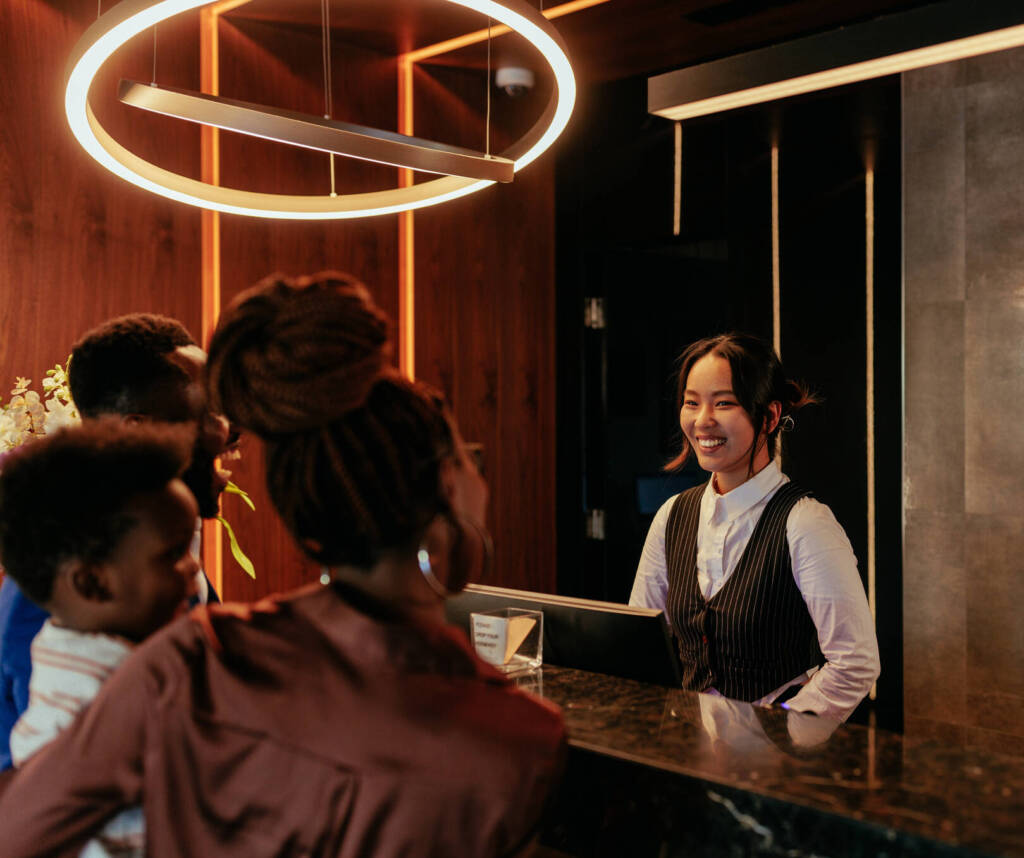
Adult Education Hospitality and Tourism 1

With greater disposable income and more opportunities for business travel, people are traversing the globe in growing numbers. As a result, hospitality and tourism are some of the fastest-growing industries in the world. This course will introduce students to the hospitality and tourism industry, including hotel and restaurant management, cruise ships, spas, resorts, theme parks, and other areas. The student will learn about key hospitality issues, the development, and management of tourist locations, event planning, marketing, and environmental issues related to leisure and travel. The course also examines some current and future trends in the field.
During this course, you will learn career-related skills and earn a badge for this accomplishment. A badge is a digital certification of your career-related learning that you can share on social media or with higher education platforms, colleges, potential employers, peers, and colleagues. Select this link to learn more about badges.
Cost: Students purchase 28 days of access for $105. Students may work as quickly through the content as they wish. Every 28 days, students may purchase an additional 28 days of access for an additional $105.
Major Topics and Concepts
Segment 1:
- Introduction to Hospitality & Tourism
- Define the parameters and characteristics of the hospitality and tourism industry.
- Examine the areas of business that make up the hospitality and tourism industry.
- Trace the development of the hospitality and tourism industry.
- Discuss the importance of service in the industry.
- Identify and discuss several current trends affecting the hospitality and tourism industry.
- Careers in the Hospitality and Tourism Field
- Define career paths and discuss how these affect the hospitality industry.
- Discuss the personal characteristics required in hospitality industry employees.
- Identify and discuss some of the career options in the hospitality and tourism industry.
- Examine the advantages and disadvantages of working in the hospitality industry.
- Discuss job benefit mixes and their role in the hospitality industry.
- Hotels
- Describe different types of hotels.
- Examine how most hotels are organized in terms of staff members.
- Discuss the tasks and responsibilities of departments such as housekeeping, security, and the front office.
- Explore how room counts are generated and why they are used.
- Discuss the practice of overbooking and its possible consequences.
- Restaurants and Food Service
- Describe different types of food-related businesses.
- Define and understand the front of the house versus the back of the house.
- Discuss the functions of the front and back of the house.
- Examine the importance of menus in the operation of a restaurant.
- Consider how managed services differ from restaurants.
- Travel Planning
- Define tourism and identify the different aspects of tourism.
- Discuss the impact of tourism.
- Examine some of the factors that influence tourism.
- Discuss ecotourism and its place in the tourism industry.
- Evaluate some of the different career positions in tourism promotion.
- Event Planning and Conventions/Exhibitions
- Identify and compare some of the different types of meetings and events.
- Discuss career areas in the field of event planning.
- Examine some of the steps in planning an event.
- Consider some of the steps in marketing an event.
- Learn about some of the tasks involved with managing an event.
- Theme Parks and Recreation
- Explain leisure and recreation and their place in modern society.
- Compare for-profit and nonprofit recreation sites.
- Identify types of government-sponsored, nonprofit, and commercial recreation.
- Examine the history of amusement and theme parks.
- Discuss the role and responsibilities of amusement and theme park managers.
- Cruise Ships and Resorts
- Discuss the similarities and differences between cruise ships and ocean liners.
- Understand cruise ship terminology and cabin choices.
- Examine some of the changes and challenges cruise ships are facing.
- Identify some different types of resorts.
- Discuss how resorts are handling common issues and challenges.
Competencies
Introduction to the Service Industry
Students will demonstrate an understanding of the service industry by analyzing career paths, discussing the importance of the industry, and identifying current trends in the industry.
Restaurant Management
Students will demonstrate an understanding of restaurant management by discussing front and back of house management and the importance of managed services and menus.
Travel and Tourism
Students will demonstrate an understanding of travel and tourism by discussing the impact of tourism, examining the factors that influence tourism, and evaluating current trends in the industry.
Event Planning
Students will demonstrate an understanding of event planning by analyzing the tasks and career paths involved with planning, marketing, and managing an event.
Hotel and Resort Management
Students will demonstrate an understanding of hotel and resort management by examining industry practices such as overbooking, identifying challenges in the cruise ship industry, and explaining the importance of departments such as housekeeping and security.

